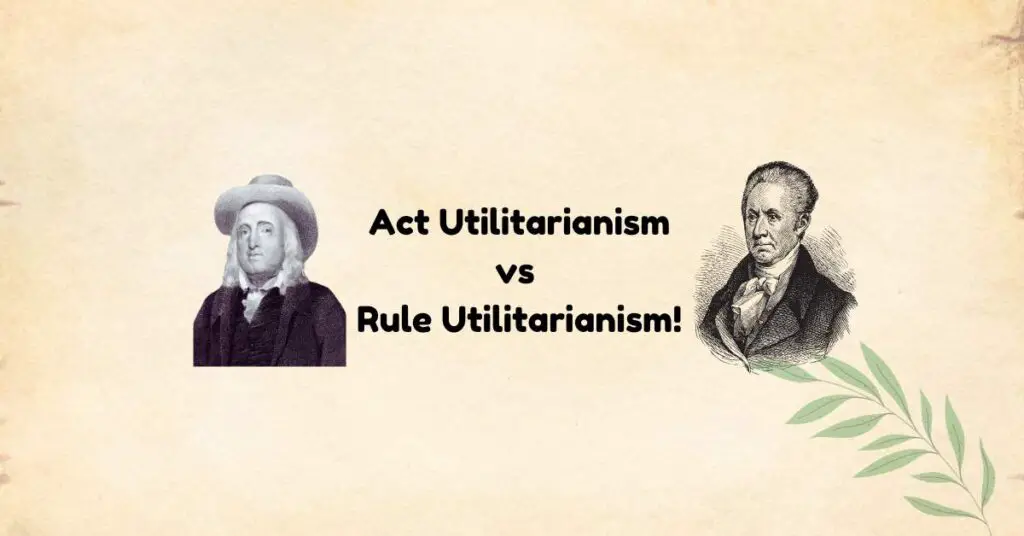Act Utilitarianism vs Rule Utilitarianism: A 6-Point Breakdown!
Have you ever wondered what guides our decisions? Ethical decision-making is crucial in our everyday lives. From choosing what to eat to deciding laws, ethics plays a role. At the heart of this is Utilitarianism, a philosophy focused on maximizing happiness.
However, within this philosophy, there are two main branches: Act Utilitarianism and Rule Utilitarianism. Act Utilitarianism evaluates actions individually, while Rule Utilitarianism focuses on following rules that generally lead to the greatest good.
Utilitarianism is all about the greatest good for the greatest number. This idea is tied to Consequentialism, which judges actions by their outcomes.
In this post, we’ll dive into these two types of Utilitarianism: act and rule. We’ll see how they differ and why it matters.
1. What is Act Utilitarianism?
Definition
Act Utilitarianism is a theory in ethics that suggests an action is right if it results in the most significant overall happiness. It evaluates each action based on its individual consequences, aiming to maximize the total amount of happiness and minimize suffering. This approach looks at the direct outcomes of actions to determine their moral worth. Here, you can see it’s somewhat similar to Hedonism, and you’re right.
Act Utilitarianism and Hedonism both aim to maximize pleasure or happiness. Act Utilitarianism evaluates the morality of actions based on their consequences, seeking the greatest overall happiness. Hedonism, as a theory of value, holds that pleasure is the only intrinsic good and pain the only intrinsic bad. Hedonistic Act Utilitarianism combines these views, determining the right action as the one that maximizes pleasure and minimizes pain for all affected.
Key Proponents
Jeremy Bentham, a prominent philosopher, championed this idea. He believed in measuring pleasure and pain to determine the best action. John Stuart Mill also recognized the significance of act utilitarian principles, although he is often more associated with Rule Utilitarianism.
Principles
The principles of Act Utilitarianism are simple: It centers on individual actions, with each action being evaluated independently. Furthermore, it examines the outcomes of each particular action.
Act Utilitarianism is based on the concept that we should act in a manner that maximizes happiness. It involves assessing the possible advantages and disadvantages of our actions.
Examples
Imagine you’re deciding whether to donate money to charity. An Act Utilitarian would consider how much happiness that donation would bring to others. If the joy and relief outweigh the loss of your money, it’s the right thing to do.
Another example could be choosing to tell a white lie. If the lie prevents harm and increases happiness more than the truth, Utilitarianism says to go for it. It’s all about the outcome and maximizing joy.
Consider a doctor faced with a decision to save five patients by using the organs of one healthy person. An Act Utilitarian might justify this action if it maximizes overall happiness, despite the moral implications.
Further Insights
Act Utilitarianism demands flexibility and situational awareness. It asks us to weigh the outcomes of our actions carefully. Critics argue that this can lead to unpredictable and inconsistent results. However, supporters believe that its focus on the present consequences makes it a practical and dynamic approach to ethics.
2. What is Rule Utilitarianism?
Definition
Rule Utilitarianism is a theory in ethics that suggests an action is right if it conforms to a rule that leads to the greatest good. Instead of evaluating each action individually, it focuses on the long-term benefits of following rules that generally maximize happiness.
Key Proponents
John Stuart Mill is a key proponent of Rule Utilitarianism. He argued that following established rules can lead to greater overall happiness than making decisions on a case-by-case basis.
Principles
The principles of Rule Utilitarianism are:
- Focus on Rules: It emphasizes following general rules that promote the greatest good.
- Evaluates Consequences of Rules: It looks at the overall outcomes of adhering to these rules, rather than individual actions.
Rule Utilitarianism aims to create a framework where actions are guided by rules that have been shown to produce the best results over time.
Examples
Consider traffic laws. A Rule Utilitarian would argue that following speed limits leads to safer roads and greater overall happiness, even if driving faster might be more convenient in a specific instance.
Another example is the rule against lying. While a single lie might seem harmless, consistently following the rule of honesty promotes trust and well-being in society.
Think about healthcare policies. A Rule Utilitarian would support rules that ensure equal access to medical care because these rules lead to better health outcomes for the community.
Further Insights
Rule Utilitarianism emphasizes the importance of stability and predictability. By adhering to rules that generally promote happiness, we can create a more reliable and just society. Critics argue that this approach can be rigid and may not account for unique situations. However, supporters believe that the long-term benefits of consistent rule-following outweigh these concerns.
Rule Utilitarianism helps us understand the value of living by principles that foster collective well-being. It’s about finding the balance between individual actions and the greater good, ensuring that our ethical framework leads to the best outcomes for everyone.
3. Key Differences Between Act and Rule Utilitarianism
Approach to Decision-Making:
Act Utilitarianism evaluates each action individually to maximize overall happiness or pleasure, considering the specific circumstances and potential outcomes. Rule Utilitarianism focuses on adhering to general rules that, when consistently followed, lead to the greatest good.
Flexibility vs. Consistency:
Act Utilitarianism is flexible, adapting to unique situations by considering each case on its own merits. This can lead to varied moral assessments.
On the other hand, Rule Utilitarianism prioritizes consistency and predictability by following established rules, providing a stable framework for decision-making but sometimes being too rigid.
Insights:
- Practicality: Rule Utilitarianism offers clear guidelines, reducing the need for constant analysis.
- Moral Intuitions: Act Utilitarianism aligns with moral intuitions in unique or extreme situations.
- Predictability vs. Adaptability: Rule Utilitarianism provides stability, while Act Utilitarianism adapts to complex situations.
- Moral Education: Rule Utilitarianism helps in teaching straightforward principles.
Act Utilitarianism vs Rule Utilitarianism Table:
Feature |
Act Utilitarianism |
Rule Utilitarianism |
Decision-Making Approach |
Individual actions |
Adherence to rules |
Flexibility |
High, considers each situation uniquely |
Lower, focuses on general rules |
Consistency |
Less consistent due to case-by-case evaluation |
More consistent due to rule-following |
Evaluation Focus |
Specific consequences of individual actions |
Overall outcomes of following rules |
Example |
Donating to charity if it maximizes happiness |
Following traffic laws for overall road safety |
Criticism |
Can lead to unpredictable results |
Can be too rigid, ignoring unique situations |
Support |
Practical for unique, immediate decisions |
Reliable and just for long-term societal well-being |
Practical Implications:
Law:
- Act Utilitarianism: Judges might make rulings based on the specific circumstances of each case to maximize happiness.
- Rule Utilitarianism: Legal systems would establish laws that generally lead to the greatest good, ensuring consistency in the application of justice.
Healthcare:
- Act Utilitarianism: Doctors might decide on treatments based on the immediate benefits to individual patients, potentially leading to varied approaches.
- Rule Utilitarianism: Healthcare policies would follow guidelines ensuring equitable access to care, aiming for the best health outcomes overall.
Everyday Decisions:
- Act Utilitarianism: Individuals might make choices based on immediate consequences, such as lying if it prevents harm.
- Rule Utilitarianism: People would adhere to principles like honesty, believing that following such rules benefits society in the long run.
By understanding these differences, we can appreciate how each approach to Utilitarianism offers unique strengths and challenges. Whether in legal frameworks, medical ethics, or daily life, the balance between flexibility and consistency shapes our moral landscape.
4. Advantages and Criticisms of Act Utilitarianism:
Advantages:
- Flexibility in Decision-Making: Act Utilitarianism allows for a case-by-case analysis of each situation, enabling tailored decisions that aim to maximize happiness in specific circumstances.
- Potential for Maximizing Happiness: By evaluating the consequences of each individual action, Act Utilitarianism strives to maximize overall happiness, considering the unique factors of each situation.
Criticisms:
- Unpredictable and Inconsistent Outcomes: Because Act Utilitarianism evaluates each action separately, it can lead to varying and unpredictable results, making it difficult to establish a consistent ethical framework.
- Justification of Morally Questionable Actions: If an action maximizes happiness in a particular instance, Act Utilitarianism may justify actions that are generally considered immoral, such as lying or breaking promises, leading to ethical dilemmas.
5. Advantages and Criticisms of Rule Utilitarianism:
Advantages:
- Consistency and Predictability: By adhering to established rules that generally promote the greatest happiness, Rule Utilitarianism provides a consistent and predictable approach to ethical decision-making.
- Encourages Adherence to Beneficial Social Norms: Rule Utilitarianism supports the development and maintenance of social norms and rules that have been shown to promote overall well-being and happiness.
Criticisms:
- Rigidity and Adherence to Suboptimal Rules: Rule Utilitarianism can become rigid, as it requires following rules even in situations where breaking them might lead to better outcomes. This can lead to adherence to rules that may be suboptimal in specific cases.
- Less Flexibility in Unique Situations: The focus on rules can limit the flexibility needed to address unique or exceptional situations, potentially leading to less optimal decisions in certain contexts.
6. Practical Applications and Case Studies:
Real-World Scenarios:
1. Public Policy:
Act Utilitarianism: When formulating public policies, Act Utilitarianism would evaluate each policy based on its potential to maximize happiness in specific contexts. For example, in deciding on healthcare allocation, Act Utilitarianism might prioritize treatments that save the most lives in a particular outbreak, even if it means deviating from standard protocols.
Rule Utilitarianism: In contrast, Rule Utilitarianism would advocate for policies that align with established rules designed to promote overall well-being. Healthcare allocation would support policies that ensure fair and consistent access to medical services based on principles that have proven to enhance overall health outcomes.
2. Business Ethics:
Act Utilitarianism: A business following Act Utilitarianism might make decisions based on immediate consequences, such as implementing a cost-cutting measure that maximizes short-term profits and employee happiness but could lead to long-term instability.
Rule Utilitarianism: Conversely, Rule Utilitarianism in business would focus on adhering to ethical practices and policies that generally promote long-term well-being, such as fair labor practices and sustainable environmental policies, even if they result in lower short-term profits.
3. Personal Moral Dilemmas:
Act Utilitarianism: In personal moral dilemmas, such as deciding whether to lie to protect a friend, Act Utilitarianism would consider the specific outcomes of the lie, potentially justifying it if it results in greater happiness or less harm in that instance.
Rule Utilitarianism: Rule Utilitarianism would weigh the dilemma against established moral rules, such as the general rule that lying is wrong because it erodes trust and social cohesion. It would likely discourage lying, emphasizing the broader consequences of maintaining honesty.
Case Studies:
Historical Example – The Bombing of Hiroshima and Nagasaki:
Act Utilitarianism: The decision to drop atomic bombs on Hiroshima and Nagasaki could be seen through the lens of Act Utilitarianism as a means to end World War II swiftly and save more lives in the long run, despite the immediate massive loss of life and suffering.
Rule Utilitarianism: Rule Utilitarianism might critique this decision, as it violates general rules against targeting civilians and causing indiscriminate destruction. Adhering to such rules is essential for maintaining moral and legal standards in warfare.
Contemporary Example – COVID-19 Lockdowns:
Act Utilitarianism: Governments using Act Utilitarianism might impose strict lockdowns in specific areas with high infection rates to maximize overall health benefits despite significant economic and social disruptions.
Rule Utilitarianism: Rule Utilitarianism would support the consistent application of public health guidelines based on principles like fairness and the greatest good for the greatest number. It would emphasize rules for mask-wearing, social distancing, and vaccination, applied uniformly to ensure overall public safety.
Conclusion:
Act and Rule Utilitarianism offer distinct approaches to ethical decision-making, each with its strengths and weaknesses. Act Utilitarianism’s flexibility allows for tailored decisions that can maximize happiness in specific situations, but it risks inconsistency and justifying questionable actions. Rule utilitarianism provides a stable and predictable framework by adhering to general rules that promote overall well-being, but it can be rigid and less responsive to unique circumstances.
In real-world applications, these theories can lead to different outcomes in public policy, business ethics, and personal moral dilemmas. Historical and contemporary case studies illustrate how each approach can be applied and the potential consequences of their application.
Ultimately, understanding the nuances of both act and rule utilitarianism helps in navigating complex ethical landscapes and making informed decisions that balance immediate benefits with long-term principles.



